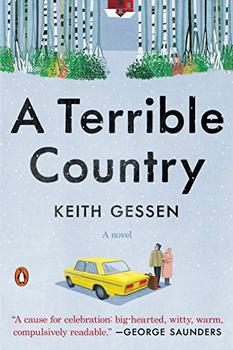Summary | Excerpt | Reviews | Beyond the Book | Readalikes | Genres & Themes | Author Bio

A Novel
by Keith Gessen
But I in turn was desperate to leave New York. The last of my old classmates from the Slavic department had recently left for a new job, in California, and my girlfriend of six months, Sarah, had recently dumped me at a Starbucks. "I just don't see where this is going," she had said, meaning I suppose our relationship, but suggesting in fact my entire life. And she was right: even the thing that I had once most enjoyed doing--reading and writing about and teaching Russian literature and history--was no longer any fun. I was heading into a future of halfheartedly grading the half-written papers of half-interested students, with no end in sight.
Whereas Moscow was a special place for me. It was the city where my parents had grown up, where they had met; it was the city where I was born. It was a big, ugly, dangerous city, but also the cradle of Russian civilization. Even when Peter the Great abandoned it for St. Petersburg in 1713, even when Napoleon sacked it in 1812, Moscow remained, as Alexander Herzen put it, the capital of the Russian people. "They recognized their ties of blood to Moscow by the pain they felt at losing it." Yes. And I hadn't been there in years. Over the course of a few grad-school summers I'd grown tired of its poverty and hopelessness. The aggressive drunks on the subway; the thugs in tracksuits and leather jackets walking around eyeing everyone; the guy eating from the dumpster next to my grandmother's place every night during the summer I spent there in 2000, periodically yelling "Fuckers! Bloodsuckers!" then going back to eating. I hadn't been back since.
Still, I kept my hands off the keyboard. I needed some kind of concession from Dima, if only for my pride.
I said, "Is there someplace for me to play hockey?" As my academic career had declined, my hockey playing had ramped up. Even during the summer, I was on the ice three days a week.
"Are you kidding?" said Dima. "Moscow is a hockey mecca. They're building new rinks all the time. I'll get you into a game as soon as you get here."
I took that in.
"Oh, and the wireless signal from my place reaches across the landing," Dima said. "Free wi-fi."
"OK!" I wrote.
"OK?"
"Yeah," I said. "Why not."
A few days later I went to the Russian consulate on the Upper East Side, stood in line for an hour with my application, and got a one-year visa. Then I wrapped things up in New York: I sublet my room to a rock drummer from Minnesota, returned my books to the library, and fetched my hockey stuff from a locker at the rink. It was all a big hassle, and not cheap, but I spent the whole time imagining the different life I would soon be living and the different person I'd become. I pictured myself carrying groceries for my grandmother; taking her on excursions around the city, including to the movies (she'd always loved the movies); walking with her arm in arm around the old neighborhood and listening to her tales of life under socialism. There was so much about her life that I didn't know, about which I'd never asked. I had been incurious and oblivious; I had believed more in books than I had in people. I pictured myself protesting the Putin regime in the morning, playing hockey in the afternoon, and keeping my grandmother company in the evening. Perhaps there was even some way I might use my grandmother's life as the basis for a journal article. I pictured myself sitting monastically in my room and with my grandmother's stories in hand adding a whole new dimension to my work. Maybe I could put her testimony in italics and intersperse it throughout my article, like in In Our Time.
On my last night in town my roommates threw me a small party. "To Moscow," they said, raising their cans of beer.
"To Moscow!" I repeated.
"And don't get killed," one of them added.
"I won't get killed," I promised. I was excited. And drunk. It occurred to me that there was a certain glamor that might attend spending time in an increasingly violent and dictatorial Russia-at that very moment bombing the small country of Georgia into submission. At three in the morning I sent a text message to Sarah. "I'm leaving tomorrow," it said, as if I were heading for a very dangerous place. Sarah did not respond. Three hours later I woke up, still drunk, threw the last of my stuff into my huge red suitcase, grabbed my hockey stick, and headed for JFK. I got on my flight and promptly fell asleep.
Excerpted from A Terrible Country by Keith Gessen. Copyright © 2018 by Keith Gessen. All rights reserved. No part of this excerpt may be reproduced or reprinted without permission in writing from the publisher.
Your guide toexceptional books
BookBrowse seeks out and recommends the best in contemporary fiction and nonfiction—books that not only engage and entertain but also deepen our understanding of ourselves and the world around us.